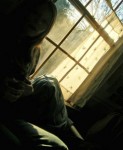My mother, of course, was not going to achieve the hospice ideal, the gold ring of having a meaningful, self-directed “death with dignity.” Her cognitive faculties, and my father’s, had frayed too far for them even to board the hospice train in any active way. My mother had not lost all of her wits by any means. But she took in new information without absorbing any of it, quickly lost her way in conversation, and became befuddled when anything complex came up. She lived more or less affably in the moment, blissfully unaware that her short-term memory relooped every few minutes. She also could trot happily through reels of old memories that remained intact in what seemed to be a special archive in her mind; they were getting fuzzy, details dropping out–but of course they were already distorted from a lifetime of editing (and if the fact-challenged abridgments, which drove me crazy, had helped my mother endure her hard life, then it seemed only fitting that even less reliable variations should give her comfort as she lay dying).

Denial, like selective memory, was a lifelong habit for my mother, and in the final weeks she repeatedly threw up roadblocks against bad news. At first it was just miserable for her, but when she weakly choked out the words “This is just gawdawful” into her breathing mask, there was resentment in it. She seemed to have given up, lost her will, the hospital social worker said–the closed eyes, the choked words, the untouched meal trays. I prayed that was true; the misery was real enough. But she came back, though barely; I think it was her habitual refusal to knuckle completely under.
She had little steam and seemed to accept her state of being bedbound and exhausted and feeble. She asked from time to time about what had brought her there, what had caused one of her nostrils to be stuffed rigid with gauze, how long she’d been there, and–most often of all, how long she was going to be there.
Her doctors realized quickly that she wasn’t able to follow, much less remember, their bedside chats about ailments and prognoses (and that my father was much the same). But even in her prime, she probably wouldn’t really have wanted to know. When a nurse let the word hospice dangle partway into a sentence before thinking better of it, I hoped my mother had missed it. But she went right to it, as though spotting a possibly invasive varmint at the gate: “Hospice?” she said, with a note of incredulity. Then, more anxiously: “Oh, Christ. That’s all I need.” I tried to talk her off the ledge: “She just meant making sure you’re comfortable, Mom.” She was lost within moments, but a residue of anxiety lingered even after she’d forgotten what had triggered it. “What is it we’re talking about?” she asked uncertainly, looking around the room. “Is there something I’m supposed to do now?” My father, who had been silent in his armchair, spoke up then, as though to clarify things: “Well, I don’t think we really know that,” he said, mustering an authoritative tone. “But when someone finds out, I’m sure they’ll tell us.”
And so the hospice plan went forward without them; A. and my sister and I met with the hospice team; I signed off on the plan.





 She dressed only to please herself, to be sure, having taken in few fashion cues, or clues, in several decades. Her ideas of style seemed to harken back to 1960, to a time when sleek plaid slacks were just the thing for getting together for bridge, mixing a cocktail, trying the twist. But you could see the effort she made, mixing and matching those slack-and-jacket ensembles into her eighties. The gulf between her and Naomi Campbell was clearly vast; she seemed from a different millenium and galaxy than the women of, say, Project Runway. But she was always tasteful and on her own terms, coordinated; black or navy slacks on the bottom, white blouse or turtleneck on top, rarely chancing a pattern bolder than a calico, sticking mostly to safe tweeds and burgundies (and the odd red, in which she looked radiant). She always took the trouble to accessorize. If the overall effect–especially on her tiny and increasingly stooped body–tended to kitsch, it was also true that she was occasionally darling.
She dressed only to please herself, to be sure, having taken in few fashion cues, or clues, in several decades. Her ideas of style seemed to harken back to 1960, to a time when sleek plaid slacks were just the thing for getting together for bridge, mixing a cocktail, trying the twist. But you could see the effort she made, mixing and matching those slack-and-jacket ensembles into her eighties. The gulf between her and Naomi Campbell was clearly vast; she seemed from a different millenium and galaxy than the women of, say, Project Runway. But she was always tasteful and on her own terms, coordinated; black or navy slacks on the bottom, white blouse or turtleneck on top, rarely chancing a pattern bolder than a calico, sticking mostly to safe tweeds and burgundies (and the odd red, in which she looked radiant). She always took the trouble to accessorize. If the overall effect–especially on her tiny and increasingly stooped body–tended to kitsch, it was also true that she was occasionally darling.